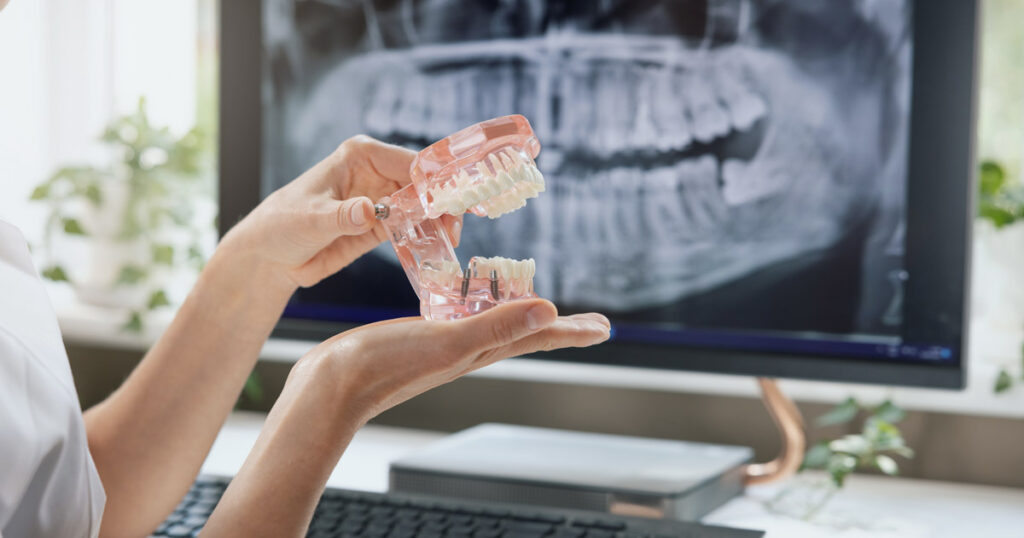Losing teeth, whether due to decay, injury, or wear over time, can have a significant impact on both your oral health and your confidence.
When you have missing teeth, it’s essential to replace them to prevent further dental issues such as bone loss and shifting of your remaining teeth. With modern advancements in dentistry, there are now several treatment options available for replacing missing teeth, each with its unique benefits.
This guide will walk you through the most common methods of tooth replacement, helping you make an informed decision that suits your needs and lifestyle.
Why replace missing teeth?
Replacing missing teeth isn’t just about improving your smile; it’s crucial for maintaining the health and function of your mouth. Failing to replace missing teeth can lead to more serious problems in the future.
Preventing bone loss and shifting teeth
When a tooth is lost, the jawbone underneath it can begin to deteriorate. This is because the bone no longer has the stimulation it needs from a real tooth. Over time, bone loss can affect the alignment of your remaining teeth, making them shift or become loose.
Replacing missing teeth can help to preserve your jawbone and keep surrounding teeth stable. This is particularly important for those who have several missing teeth, as the longer they remain untreated, the more complicated the solution may become.
Supporting facial structure and speech
Missing teeth, especially in the front of the mouth, can change the structure of your face. Without teeth to support the surrounding soft tissues, your face may appear sunken, making you look older. Replacing teeth also restores proper alignment for your mouth, improving your ability to speak clearly.
Many patients who lose teeth in the front of the mouth find that replacing them helps with pronunciation and communication, especially when they feel self-conscious about speaking.

Dentures: the traditional option
Dentures have long been the go-to solution for replacing missing teeth. Although they’re less commonly used today due to advancements in dental implants and bridges, they remain a popular and effective choice.
Full vs partial dentures
A full denture replaces all your teeth in either the upper or lower jaw, while a partial denture is used when you still have some natural teeth remaining. Both options help restore the function of your mouth, allowing you to chew food and speak more clearly.
Partial dentures may also prevent your remaining teeth from shifting into gaps, offering an affordable solution if you’re missing several teeth.
Pros and cons of modern dentures
Dentures are an affordable and non-invasive option for many patients, particularly those with several missing teeth.
However, they are not a permanent solution and may require regular adjustments. They can also be uncomfortable, especially during the adjustment period, and may affect your ability to chew certain foods.
Additionally, wearing dentures can cause bad breath if they are not properly cleaned and maintained. Over time, they may need to be relined or replaced as your mouth changes.
Dental bridges: a fixed solution
Dental bridges are another option for replacing missing teeth. A bridge uses your existing teeth or implants to anchor a new tooth in place.
Types of dental bridges
There are several types of dental bridges available, including traditional, cantilever, and Maryland bridges.
Traditional bridges use crowns placed on the adjacent teeth to hold the replacement tooth in place. Cantilever bridges are ideal when there are teeth on only one side of the missing tooth, while Maryland bridges use a metal or porcelain framework to bond to the adjacent teeth without the need for crowns.
The choice of bridge depends on the location of the missing tooth, the health of surrounding teeth, and your budget.
When is a bridge the right choice?
Dental bridges are a good option if you have a single missing tooth or multiple missing teeth, and your adjacent teeth are healthy enough to support the bridge. Unlike dentures, dental bridges are fixed and cannot be removed. They provide a more permanent solution to tooth loss.
However, the process of fitting a dental bridge often requires the dentist to file down the adjacent teeth to make room for the crowns, which may not be ideal for everyone.

Dental implants: a long-term investment
Dental implants are considered one of the best solutions for replacing missing teeth due to their durability and natural appearance.
What is a dental implant?
A dental implant is a titanium post surgically inserted into the jawbone, where it acts as the root for a new tooth. Once the implant integrates with the bone, a crown or bridge is placed on top to restore the tooth. Implants can replace a single tooth or multiple teeth, and they offer superior stability compared to other options, such as dentures or bridges.
Benefits and potential risks of implants
Dental implants are highly effective for replacing both single teeth and multiple teeth. They provide the closest solution to natural teeth, offering excellent functionality and appearance.
Implants also help prevent bone loss in the jaw, as they mimic the function of real teeth by stimulating the bone during chewing.
However, the procedure can be more expensive than other options and requires surgery, which may involve a longer recovery time. Some patients may need bone grafting if they have significant bone loss in the jaw.
Less common and emerging treatments
While dentures, bridges, and implants are the most common options for replacing missing teeth, there are other treatments that may be suitable in certain circumstances.
Resin-bonded bridges
For patients who have a single missing tooth and no damage to the adjacent teeth, a resin-bonded bridge may be a good option. This is a minimally invasive solution that uses a new crown bonded to adjacent teeth. It is typically used for the replacement of front teeth and is a cost-effective option for those seeking a temporary solution.
Mini implants and other innovations
Mini implants are a smaller version of traditional dental implants and can be a good option for patients with limited bone density. These implants are often used to replace several teeth or to stabilise a partial denture.
Some patients may also benefit from the use of All-on-4 implants, where a full arch of teeth is supported by just four implants, offering a permanent solution without the need for multiple individual implants.

Making the right choice for you
Choosing the right method to replace missing teeth depends on several factors, including your dental health, budget, and personal preferences.
Talking to your dentist: getting a personalised treatment plan
The final decision on which treatment is best for you should be made in consultation with your dentist.
They will consider your overall dental health, the extent of tooth loss, and your lifestyle needs to recommend the most suitable treatment options.
Your dentist may also discuss the possibility of additional procedures, such as bone grafting, if bone loss is a concern, or the need for a new crown to complete the tooth replacement procedure.
Factors to consider: cost, health, and lifestyle
Some treatments, such as dental implants, are more expensive but provide a long-term solution. Others, like removable partial dentures, are more affordable but may require more frequent replacements and adjustments.
Your dentist can help you evaluate the best options based on your oral health, the number of teeth you need to replace, and the condition of your remaining teeth. When considering the cost, it’s important to factor in both the upfront price and the potential long-term costs, such as maintenance or additional procedures.

Medicred: dental financing for your teeth replacement treatment
At Medicred, we understand that replacing missing teeth is an important step in maintaining your oral health and restoring your confidence.
However, we also recognise that the cost of certain dental treatments, such as dental implants or bridges, can be a significant financial burden. That’s why we offer flexible and affordable dental financing options to help you access the treatment you need without compromising your financial well-being.
With Medicred, you can spread the cost of your dental procedure over a period that works for you, making it easier to replace missing teeth and enjoy the long-term benefits of a healthy smile. Whether you’re considering dental implants, dentures, or dental bridges, our financing solutions are designed to fit your individual needs and budget.
Our simple online application process allows you to apply for a dental loan in minutes, and we offer competitive rates with repayment terms that suit your lifestyle. Plus, we work with a wide range of dental practices across the UK, so you can use your Medicred loan for treatments at your trusted dentist.
Don’t let cost hold you back from getting the dental care you deserve. With Medicred’s dental financing, replacing your missing teeth can be an affordable reality. To learn more about how we can help, visit our website and apply for a loan today.